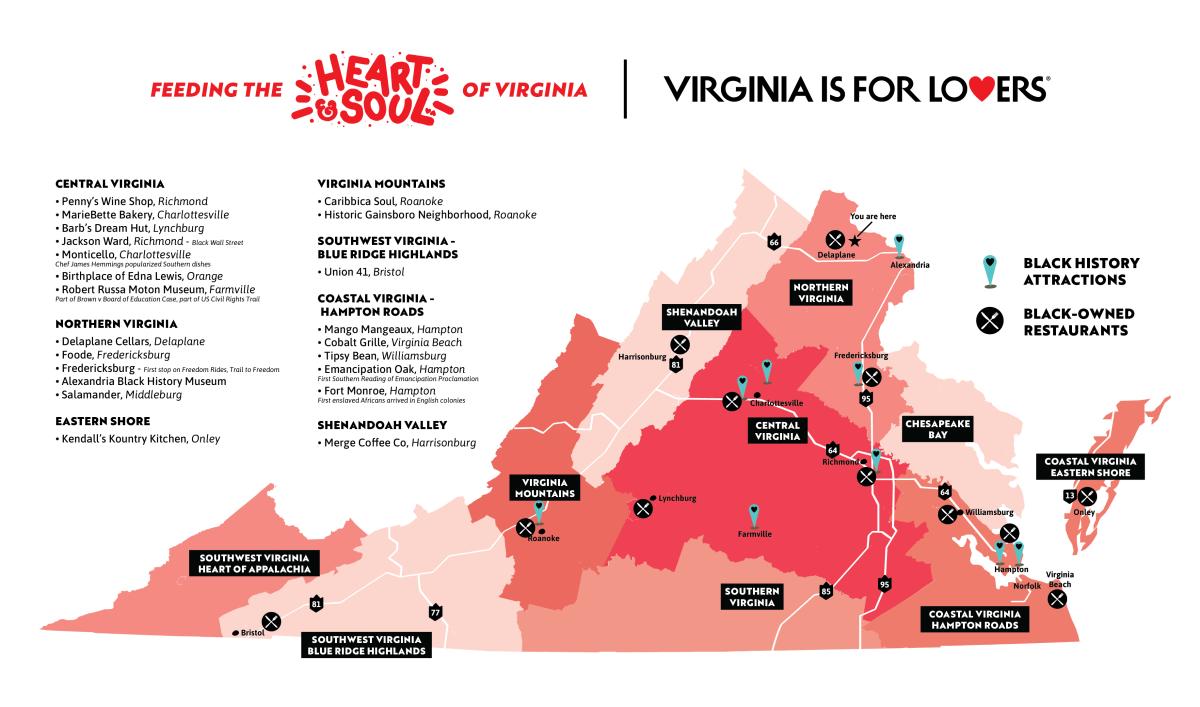Virginia’s story is critical to the very fabric of American history, not only as the home of the first permanent English settlement, but also home to the longest continuous experience of Black history and culture in our nation.
When the first enslaved Africans were brought to the shores of Hampton in 1619, they were unaware this would mark the beginning of slavery in America, casting a lasting shadow over the idea of “freedom.” They had no idea that their descendants would change the course of history while creating a rich sense of culture, particularly regarding food.
Their expert knowledge of farming practices, the introduction of new crops from their homeland (often braided as seeds in their hair), and innovative ways of cooking would be combined with knowledge gained from Indigenous communities to establish an entirely new cuisine in the southern regions of America.

Photo Credit: Big Orange Frame
As one of the basic human needs, food is the cornerstone of any community or culture. Enslaved people prepared and served food on plantations, but often faced their own food insecurity and dangerous conditions, spending hours over open flames.
Enslaved people would receive scraps and only had a few hours a day to tend to their gardens, which led to innovations in cooking. They created one-pot meals and stews, a common practice in African cooking, to stretch out their portions. This ingenuity was passed down for generations and led to the Southern traditions and dishes we still favor today such as gumbo, the West African word for okra.
Founding the Flavors of Our Nation

As with many stories of Black history, our accomplishments and successes have often been overlooked in the narrative of American history. One important figure in the story of American cuisine is Virginia native James Hemings, a French-trained chef who was enslaved by Thomas Jefferson. He blended French and African styles to create unique American adaptations of foods like macaroni and cheese (arguably the most important side dish at many gatherings), ice cream, and crème brûlée.

Hemings and George Washington’s chef, Hercules Posey, were considered celebrity chefs of their time. Both Virginia-born men spent their formative years in bondage despite working for two men who fought for America’s freedom.
Trained to be a chef at Mount Vernon, Posey often clocked 16-hour days to prepare meals for his enslaver. Washington brought the chef with him to the nation’s capital in Philadelphia, but sent him back to Virginia every six months to maintain his enslaved status. Otherwise, Posey could have applied for his freedom.
Posey would later escape to freedom in 1797, but was forced to leave his family behind. Once in the North, he was never found by his former enslaver, but his children were separated from each other, a common practice on plantations.
Edna Lewis: A Virginia Icon
Coming out of enslavement, Black people continued to use their skills and talents in the kitchen to create their own restaurants and catering services. This period of self-sufficiency ushered in a new era of Black contributions to cooking and financial stability during Reconstruction.

History lauds the contributions of Edna Lewis, another Virginia native. Her 1976 cookbook put Southern cooking on the international culinary map. She practiced the idea of farm-to-table before it became a trend and knew the importance of planting and eating with the season.
Lewis became the chef at Cafe Nicholson in New York, a popular hot spot for creatives like Salvador Dali and William Faulkner. She shifted attitudes toward Southern food, earning her the nickname The Grand Dame of Southern Cooking.
Lewis once said, “My first memory of who I was, it was food. No one taught me to cook, I just saw it at Aunt Tinny’s up the path and in my mother’s kitchen.”
For Lewis and so many others, the Black culinary experience and family go hand in hand. Kitchens have often been considered the heartbeat of the home. Stories and recipes were passed down around a kitchen table, creating a sense of bonding between generations. The most important ingredient in any kitchen has always been love. Cooking has the power to offer a sense of comfort in times of immense struggle and a taste of triumph in times of celebration.
Black History's Roots in Richmond

Photo Credit: Scott Brown
Today, one in four Black people in America can trace their roots through Richmond, Virginia. As the birthplace of Black culture, Virginia is the most appropriate place to host a family reunion in the United States, and summer in Virginia offers the perfect backdrop for a tradition that dates back to Emancipation.
During slavery, families were intentionally separated, and at its end, they longed to be reunited. It comes as no surprise that these gatherings featured menu items popularized by James Hemmings, Hercules Posey, and Edna Lewis—the true founders of American cuisine. Virginia is where they created and preserved these recipes that tell the story of the country.

Photo Credit: Salamander Resort
For the past four years, The Family Reunion presented by Kwame Onwuachi has welcomed world-renowned Black chefs, historians, and culinary experts to the Salamander Resort and Spa in Middleburg, Virginia for a weekend of conversation, community, and collaboration. At the core of these moments is food.
This is a celebration of innovation and achievement in food, but more than anything it is a celebration of love. Love for the dishes that remind us of home, love for our shared history and the music that connects us, and love for family, old and new. It gives us a chance to come home, celebrate Black accomplishments in the culinary world, and have conversations over meals with one goal—come as friends, and leave as family.



